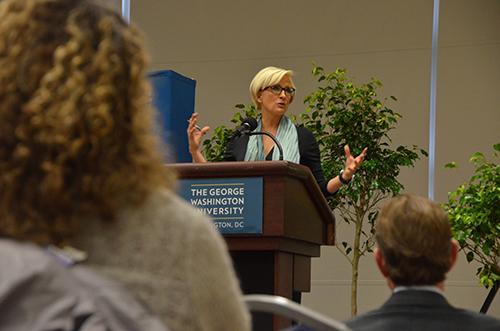
As a freshman at Georgetown University, Mika Brzezinski remembers hiding in her bottom bunk in New North dorm and finishing off an entire large pizza from Domino’s.
Then she would take diet pills, run for eight or 10 miles, and a few weeks later, do it again.
“I was such a mess,” Brzezinski, now the cohost of MSNBC’s “Morning Joe,” told a crowd of GW students and faculty on Tuesday.
Brzezinski has suffered from eating disorders including anorexia and bulimia for 30 years, which she recently chronicled in a book called, “Obsessed: America’s Food Addiction – and My Own.”
It started when she was 15, when she began running between six and 12 miles a day in between her daily runs to 7-Eleven or McDonalds, where she’d scarf down Big Macs and pizza pockets while driving to school.
Then she went into television journalism, where she found herself and her body constantly scrutinized. Shortly after she had her first child, she went to a job interview and was told she needed to lose weight – a powerful message that she said fueled her disorder.
She slimmed down to 118 pounds and landed jobs at networks like CBS and later MSNBC, where she continued to starve herself and then gorge. She once dug into trays of Mexican food that was meant for the staff of “Morning Joe” while sitting in the backseat of a car.
“My brain would not rest until I was biting into that Big Mac and all that other food was in front of me. That’s when I felt peace,” she said. “It’s funny, but it’s not when you really think about it. It’s frightening.”
Brzezinski began to open up about her disorder within the last few years. She has seen therapists, spoken in public and then last year, wrote a book to help her “stop lying to the world completely.” Now she is 140 pounds, which she admitted is still too heavy in her mind, but she forces herself not to think about the numbers.
For years, she said she hid the pressure to constantly be thin – so thin that she shared jeans with her teenage daughter.
“That was part of the lie, making it look so easy,” she said about being TV skinny. “That all backs up the sickness.”
During the question-and-answer session, freshman Quincy McGee said he lost 150 pounds while fighting his food addiction.
At his heaviest, McGee weighed 325 pounds and went to McDonalds three or four times a day. When he said that he now weighs 170 pounds, Brzezinski started a round of applause.
After the event, McGee said he and Brzezinski recorded a “selfie” video of encouragement, which he sent to his mom. “She was freaking out,” McGee said.
Throughout the event, which was the highlight of the School of Public Health and Health Services’ eating disorder awareness week, Brzezinski urged students to seek help. She asked how many members of the audience had an unhealthy relationship with food, and about one-third raised their hands.
Russell Ramsey, an alumnus and the former Board of Trustees chairman, also spoke about his struggle to help his oldest daughter deal with her eating disorder.
He said he thought his daughter was happy and “vibrant,” but quickly found that she was struggling with deep issues related to food. But her weight loss quickly “turned into incredible turmoil and challenges” for his family, he said.
Since then, he and his wife, Norma, have “searched the world for solutions to try to help our daughter to deal with what seemed like such simple issues.”
Ramsey said he knew many in the audience had faced similar struggles and encouraged them to realize that they are not alone.
Before introducing Brzeksinki, Ramsey described her as the hero of the growing movement.
“I really hope this is the beginning of a call to action,” Ramsey said.





